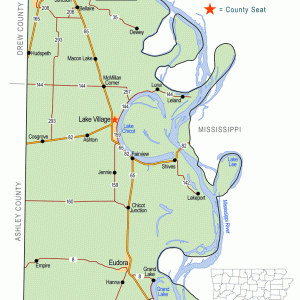calsfoundation@cals.org
Columbia (Chicot County)
Columbia, founded during the late territorial period, was a busy settlement located on the western bank of the Mississippi River in extreme southeastern Arkansas. The one-time Chicot County seat was an important shipping point for local cotton plantations and the site of a branch of the Arkansas Real Estate Bank. Over time, the banks of the river slowly eroded the town site until it was eventually washed away.
When Chicot County was established on October 25, 1823, a board of commissioners selected the settlement of Villemont as the county seat. In 1833, as the county boundaries changed, the seat of government was removed to a more central location a few miles upriver at Columbia. The added importance of being the seat of government increased interest in the small settlement. The area, which was considered to be one of the most fertile areas of Arkansas, was already home to several large cotton plantations. Much of that cotton was shipped from the settlement’s waterfront, and goods from as far away as New Orleans, Louisiana, were offloaded at the port. In the 1830s, the Military Road was constructed through Columbia, making it the southernmost terminus of the main roadway connecting to Little Rock (Pulaski County). Also in 1833, the same year that mail delivery began, Henry Smith was paid ten dollars to conduct an auction selling town lots. In 1835, a two-story frame courthouse and jail were approved for construction. The settlement began to attract businesses and professionals. Some sources report it was home to as many as 500 residents at its peak.
In 1838, it became the site of one of four branch offices of Arkansas Real Estate Bank, a state venture into banking. The president of the branch was local resident Sanford Faulkner, the author of the famous story “The Arkansas Traveler.” Local investments in the bank amounted to more than one million dollars, creating financial difficulties for many area planters when the state system failed in 1842. Faulkner himself lost his Chicot County assets amounting to almost $200,000. In 1838, the Columbia and Bartholomew Railroad Company was incorporated; however, only portions of the route were completed before the Civil War. On April 22, 1842, former president Martin Van Buren stopped at Columbia when the steamboat on which he was a passenger docked there.
As a river port settlement, Columbia had a reputation as something of a rough place. The outlaw band of John Murrell is said to have spent some time drinking there. One observer described the settlement as a frequent stop of “gamblers and roughs, who sometimes congregated in considerable number and continues their brawling lawlessness day after day.” The observer went on to say that “shootings and lynchings were of frequent occurrence” among the gamblers. On July 4, 1846, an enslaved man known only as William was lynched at Columbia.
Two major steamboat disasters occurred near Columbia. On June 9, 1836, and four miles above Columbia, the Rob Roy suffered a fatal boiler explosion that killed at least seventeen people. On January 6, 1853, the J. Wilson exploded shortly after departing Columbia, resulting in dozens of deaths.
Columbia faced the same fate as Villemont—slowly being washed away by the Mississippi River. In 1855, it was decided to move the county seat to a safer location about fifteen miles inland to Masona. Despite losing its importance as the county seat, the settlement still operated as a shipping point for several years.
The Civil War was a severe blow to the area economy. Many local men enlisted in one of the several Confederate companies raised in Chicot County. As the war progressed, traffic on the river was hampered and then almost ceased when Federal forces took control of the waterway by the end of 1863. River landings like Columbia became isolated, with the exception of their potential use by the military. Military forces on both sides moved in and out of the county, with a skirmish being fought at Gaines Landing on July 20, 1862, and an engagement at Old River Lake on June 6, 1864. After the 1864 engagement, Union forces occupied Lake Village (Chicot County), moving through Columbia the next day and boarding transports at Luna Landing, approximately two miles up the river.
Columbia never returned to its pre-war prosperity. With the construction of the railroad into southern Arkansas by the 1880s, small river port towns lost much of their importance. Nearby inland towns such as Dermott (Chicot County) and Lake Village began to go through growth once experienced by those settlements located on the banks of the Mississippi River. Within a short period of time, little remained of Chicot County’s second county seat. Sometime in the 1870s, it is believed that all that did remain was claimed by the Mississippi River.
For additional information:
Biographical and Historical Memoirs of Southern Arkansas. Chicago, IL: Goodspeed Publishing Co., 1890.
Brannon, Sheila Farrell, ed. Tribute to Chicot County, Arkansas. Dermott, AR: 2000.
Yarborough, Anna Nash. “A New Day in the Bayou County.” Arkansas Democrat Magazine, February 2, 1958, p. 12.
Mike Polston
Encyclopedia of Arkansas History & Culture
 Chicot County Map
Chicot County Map  Columbia Marker
Columbia Marker 




Comments
No comments on this entry yet.